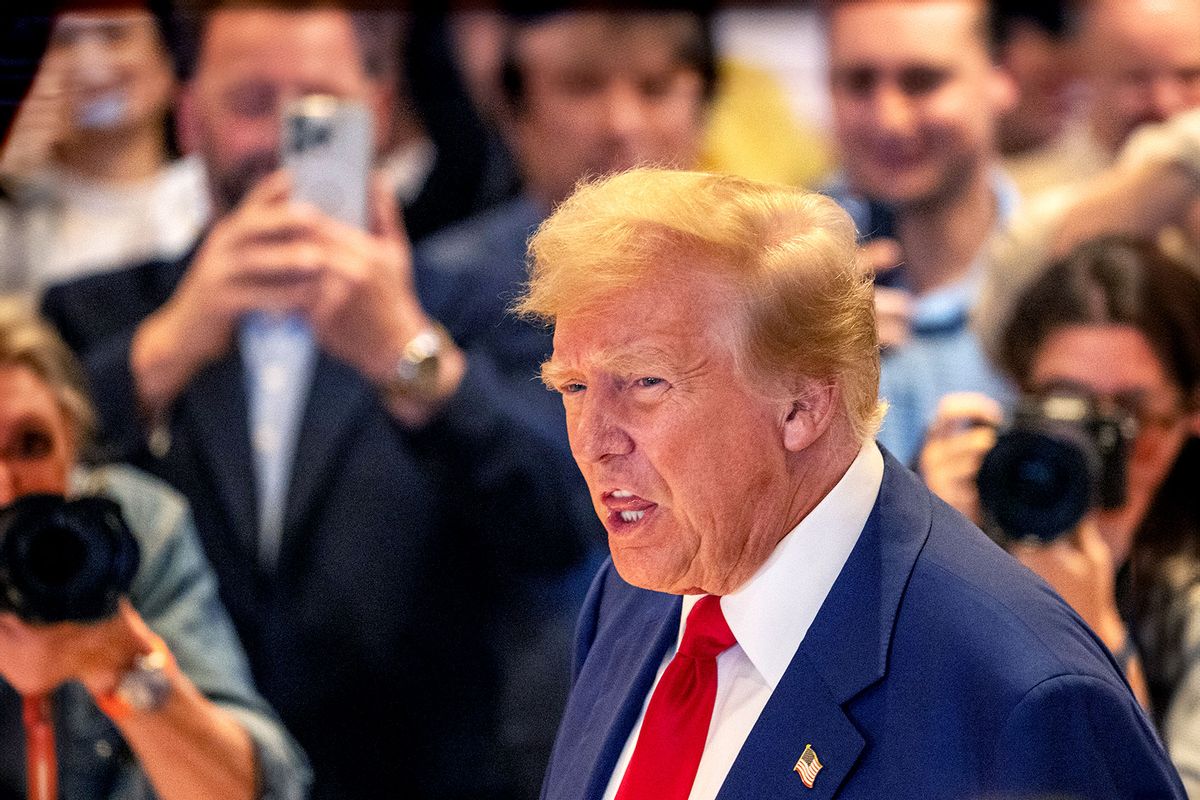When Donald Trump lost the 2020 presidential election, right-wing attorney John Eastman came up with a legal coping strategy: What if, he proposed, we just pretend that Trump won? That strategy hit a wall when former Vice President Mike Pence refused to play along, with Trump declaring him a coward and traitor while hundreds of his supporters stormed the U.S. Capitol in an attempted coup d’etat.
Hundreds of January 6 insurrectionists are now behind bars. Eastman, a fellow at the conservative Claremont Institute, can no longer practice law in his home state of California, and was recently indicted for his role in trying to overturn voters’ will in the state of Arizona, but he nonetheless remains a free man. And he’s back, offering the MAGA faithful another glimmer of hope that their 77-year-old leader will be able to avoid any and all consequences.
Speaking with Emerald Robinson, a former Newsmax personality fired for claiming vaccines are the literal spawn of Satan, Eastman denounced the verdict in Trump’s hush money trial and expressed hope that the will of the jury could be overturned by friends of the defendant: the U.S. Supreme Court’s conservative majority.
“They have to see what the rest of us have seen: how dangerous the left’s lawfare have now become,” Eastman said, even as he called for prosecuting members of law enforcement for investigating Trump’s friendly relations with the Russian government.
That’s now the conservative, law-and-order refrain in the wake of 12 New Yorkers unanimously pronouncing the Republican candidate guilty on 34 felony counts. Trump, skipping past the state appeals courts that would be the first to consider any petition to overturn his verdict, has been quick to embrace the latest scheme for undoing the will of the people – which, to be fair, is also the obvious play here for a convicted felon with allies on the country’s highest court.
On his website, Truth Social, Trump on Sunday complained that his July 11 sentencing date, at which he faces the prospect or probation or up to four years behind bars, comes just before the Republican National Convention (omitting that the date, following the standard judicial timeline, was agreed to without objection by his defense team). Instead of Judge Juan Merchan, Trump appealed to the likes of Samuel Alito and Clarence Thomas, stating: “The United States Supreme Court MUST DECIDE!”
House Speaker Mike Johnson, R-La., appearing on Fox & Friends, likewise urged the court’s 6-3 conservative majority, including three justices appointed by the defendant, to “step in” and correct the jury’s decision.
“I think they’re as deeply concerned as we are, so I think they’ll set this straight,” the Louisiana Republican declared.
We need your help to stay independent
Anything, of course, is possible when it comes to precedent and the U.S. Supreme Court, which is to say: just because it would be an absurd stretch for the country’s highest court to overturn the first criminal conviction of a former president doesn’t mean that it’s impossible – not in an era where a justice’s political biases are openly waved from the flagpole outside their home.
What we can say is that, were the court to follow precedent and decide to uphold the rule of law, it would not be likely to overturn a unanimous jury verdict upheld by every previous court that heard the case.
“This is a garden-variety state court conviction,” trial lawyer Mark Zauderer told The New York Times, arguing the case lacked any of the “usual red flags” that might result in a successful appeal. “I don't see a plausible path to the Supreme Court.”
Want a daily wrap-up of all the news and commentary Salon has to offer? Subscribe to our morning newsletter, Crash Course.
Neal Katyal, former acting solicitor general under President Barack Obama, does see a path for Trump, but not necessarily one that ends in victory.
“Maybe they’ll find some federal issue here and maybe there will be an appeal that will get there,” he told MSNBC. “But I think it’s tough. And I think it’s tough here, particularly because … the jury unanimously found Trump guilty of not just one count, but 34 separate criminal convictions that are felonies.”
Former federal prosecutor Duncan Levin also thinks there’s a chance Trump gets his case before the Supreme Court, citing the fact that the jury instructions allowed for a conviction even if jurors were not necessarily unanimous on what underlying crime – tax evasion, say, or breaking campaign finance law – was furthered by Trump’s falsifying business records. However shaky, Trump’s legal team could try to move the case to the federal court system by arguing that those jury instructions conflict with the Sixth Amendment of the U.S. Constitution, which enunciates the right to a “speedy and public trial” and to “be informed of the nature and cause of the accusation.”
“An appeal is 100 percent likely,” Levin said on MSNBC, arguing that it would be a relatively straight forward path Alito, Thomas and the rest of the conservative majority. “Once he gets into federal court, he’s going to be rocketing up to his five friends on the Supreme Court – once he gets his foot in the door there, that’s what his plan is going to be.”
For those with a somewhat cynical view of the country’s highest court and its claims to be above partisan politics, the Supreme Court tugging at a fig leaf to protect Trump is may not seem so implausible. But no conservative justice can overturn time. When he accepts the Republican Party nomination, Trump will no longer just be a convicted felon but, at a minimum, a convicted felon on probation. And while he can appeal any sentence he receives, as Axios noted, the appeals process will take months to play out, just at the state level, “making it very unlikely to conclude before November.”



Shares